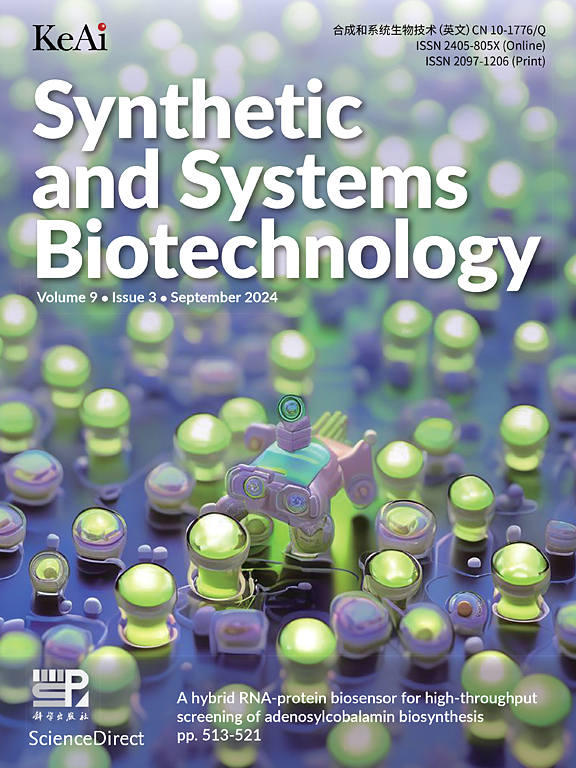PEX3 gene knockout influences recombinant xylanase expression by Komagataella phaffii
IF 4.4
2区 生物学
Q1 BIOTECHNOLOGY & APPLIED MICROBIOLOGY
引用次数: 0
Abstract
Komagataella phaffii is a methylotrophic yeast harboring a tightly regulated alcohol oxidase promoter (PAOX1), which is now widely used for recombinant protein production. During PAOX1 expression phase by methanol induction, a methanol metabolism organelle peroxisome enlarged and occupied 80 % of K. phaffii cell through peroxins functions of matrix protein import and organelle division. Using a K. phaffii expressing xylanase in this study, each of all 23 PEX genes of K. phaffii, encoding peroxin, was knockout to influence the peroxisome size, leading to changes of K. phaffii physiological status and recombinant xylanase expression. It was observed that PEX3 knockout reduced peroxisome size by 54.3 %, increased xylanase expression by 29 %, decreased apoptosis ratio by 70.6 %. Transcriptome analysis revealed that PEX3 gene knockout decreased 18 other PEX genes of all three steps of peroxisome propagation, biogenesis, matrix protein import, and peroxisome fission. PEX3 gene knockout influenced expression of ribosomal subunit-related and protein transportation significantly based on gene function annotation and enrichment analysis. Additionally, Therefore, PEX3 gene knockout promoted xylanase folding correctly via Sec63 complex, and PDI1 significantly. In a summary, PEX3 gene knockout provided a novel strategy to enhance recombinant xylanase by K. phaffii.
PEX3 基因敲除影响 Komagataella phaffii 重组木聚糖酶的表达
法菲Komagataella phaffii是一种甲基营养酵母,含有严格调控的酒精氧化酶启动子(PAOX1),目前广泛用于重组蛋白的生产。在甲醇诱导PAOX1表达阶段,甲醇代谢细胞器过氧化物酶体通过过氧化物蛋白的基质蛋白输入和细胞器分裂功能,扩大并占据了菲氏K. phaffii细胞的80%。本研究利用表达木聚糖酶的K. phaffii,敲除K. phaffii编码过氧化物酶的全部23个PEX基因,影响过氧化物酶体大小,导致K. phaffii生理状态和重组木聚糖酶表达的变化。结果显示,敲除PEX3后,过氧化物酶体大小减少54.3%,木聚糖酶表达增加29%,细胞凋亡率降低70.6%。转录组分析显示,敲除PEX3基因减少了其他18个参与过氧化物酶体繁殖、生物发生、基质蛋白输入和过氧化物酶体裂变三个步骤的PEX基因。基于基因功能注释和富集分析,PEX3基因敲除显著影响核糖体亚基相关蛋白的表达和转运。此外,PEX3基因敲除通过Sec63复合物和PDI1显著促进木聚糖酶正确折叠。综上所述,敲除PEX3基因为K. phaffii增强重组木聚糖酶提供了一种新的策略。
本文章由计算机程序翻译,如有差异,请以英文原文为准。
求助全文
约1分钟内获得全文
求助全文
来源期刊

Synthetic and Systems Biotechnology
BIOTECHNOLOGY & APPLIED MICROBIOLOGY-
CiteScore
6.90
自引率
12.50%
发文量
90
审稿时长
67 days
期刊介绍:
Synthetic and Systems Biotechnology aims to promote the communication of original research in synthetic and systems biology, with strong emphasis on applications towards biotechnology. This journal is a quarterly peer-reviewed journal led by Editor-in-Chief Lixin Zhang. The journal publishes high-quality research; focusing on integrative approaches to enable the understanding and design of biological systems, and research to develop the application of systems and synthetic biology to natural systems. This journal will publish Articles, Short notes, Methods, Mini Reviews, Commentary and Conference reviews.
 求助内容:
求助内容: 应助结果提醒方式:
应助结果提醒方式:


